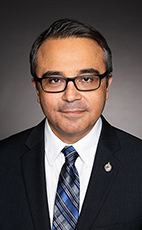44th Parl. 1st Sess.
May 30, 2022 11:00AM
- May/30/22 8:36:06 p.m.
- Watch
Madam Chair, it is great to be here in the committee of the whole.
Fishing is the lifeblood of our rural coastal communities from coast to coast to coast. It is the main driver of local economies. Whether it is bait, gear or simply grabbing a coffee on the way to wharf, it drives jobs directly and indirectly.
I have been on the wharves in every area of my riding of Cape Breton—Canso, chatting with the hard-working fishers, whether it is in Whitehead, Baxters Cove, Chéticamp, Glace Bay Harbour, Grand Étang and all points in between. People like Jetty Boudreau, Lauchie MacKinnon, Herb Nash, Bobby Trucker, Gord McKinnon, Carla Samson, Leonard Leblanc, and the many fishers in the three first nation communities that I serve in Potlotek, Paqtnkek and We'koqma'q, understand the need to pass the knowledge on to future generations and know how to preserve the species for the future.
I am always impressed by how much homegrown innovation comes directly from all of our rural communities. I think of a company in my riding, Louisbourg Seafoods, through whose constant and progressive innovation is able to provide hundreds of rural jobs to Canadians, which are steady and predictable employment for its staff, their families and the communities that I serve and that we serve.
With that in mind, can the minister please speak to her experiences as minister with the hard-working folks of this industry, and in particular her vision, her vision to continue to support rural coastal economies, but in particular the blue economy?
265 words
- Hear!
- Rabble!
- add
- star_border
- share
- May/30/22 9:56:38 p.m.
- Watch
Mr. Chair, I appreciate the minister's highlighting the incredible results of this program. It is clearly innovative and paying off for our ocean and marine coastal ecosystems, which are essential to Canada's livelihoods and a good fishery sector.
40 words
All Topics
- Hear!
- Rabble!
- add
- star_border
- share
- May/30/22 10:25:23 p.m.
- Watch
Mr. Chair, I thank the member for the glowing reviews of the Cape Breton—Canso area. I think my parliamentary secretary appreciated that very much.
Marine protected areas are an important tool in supporting the local economic prosperity of coastal communities. The question is about how we decide how to protect areas within an MPA. It is by using the best available knowledge. Areas of ecological and biological significance are identified, and protection approaches are advanced, through an extensive process of consultation, engagement and scientific and socio-economic assessments to ensure that the protections will be effective. This will include members of local communities, of course.
Following this process and depending on the MPA's unique conservation objectives, activities may either be allowed, limited or prohibited. Once an MPA is established, the activities that are allowed to occur are managed in an adaptive manner that is flexible in response to ocean changes. An adaptive management approach is conducted with local partners in order to effectively protect over the long term.
171 words
- Hear!
- Rabble!
- add
- star_border
- share
- May/30/22 10:43:25 p.m.
- Watch
Mr. Chair, I hope that my Conservative colleagues from across the way will be okay with another non-coastal MP having an interest in fisheries and oceans. I hope it is not implied that Conservatives, particularly our coastal MPs, have a monopoly over this issue, but I certainly am looking forward to participating today. I would like to take this opportunity—
62 words
- Hear!
- Rabble!
- add
- star_border
- share
- May/30/22 10:43:57 p.m.
- Watch
Mr. Chair, I would ask the member to get to the relevance of whether he is from a coastal community or an inland community in his time tonight. I would ask him to clarify.
34 words
- Hear!
- Rabble!
- add
- star_border
- share
- May/30/22 10:44:04 p.m.
- Watch
If we are declaring whether we are coastal or not, I am a coastal member as well.
The hon. parliamentary secretary.
21 words
- Hear!
- Rabble!
- add
- star_border
- share
- May/30/22 10:45:39 p.m.
- Watch
Mr. Chair, again, with respect, the member was speaking once again as though only coastal communities have relevance in this conversation. I would like him to recognize that there are many non-coastal communities that appreciate the fisheries and what they provide to Canada. Maybe he could clarify what he is talking about.
53 words
- Hear!
- Rabble!
- add
- star_border
- share
- May/30/22 11:12:47 p.m.
- Watch
Mr. Chair, I understand that the proportion varies according to the species and the location.
I will ask another question along the same lines. What percentage of seafood landings are processed in coastal communities?
34 words
- Hear!
- Rabble!
- add
- star_border
- share
- May/30/22 11:45:39 p.m.
- Watch
Mr. Chair, I will be sharing my time with the member for Saanich—Gulf Islands.
Small craft harbours is a key Fisheries and Oceans Canada program and one that is important for Canada's economy because it provides critical support to the commercial fishing industry, which has annual landings valued at more than $3.5 billion. Our government has provided the program with important resources to help meet its mandate. Our government has announced $784 million in new funding for the small craft harbours program since 2016. This funding supports Canadians in the fishing, aquaculture, tourism, environmental, recreational, marine engineering and construction industries and strengthens the resilience of coastal and rural communities. In essence, it is the economic hub in rural and Atlantic Canada, where I am from.
From coast to coast to coast, Fisheries and Oceans Canada owns, operates and maintains a national system of harbours to provide commercial fish harvesters and other small craft harbour users with safe and accessible facilities. Ninety per cent of Canadian fishing vessels are using small craft harbours, and fish harvesters depend on these facilities not only to support their livelihoods, but also to create economic wealth in the communities they reside in. At the present time, the program is responsible for 973 harbours, 675 of which are core harbours that are considered essential to Canada's fishing industry. The remaining 298 are used less by the industry or recreational harbours.
In many communities, these forming fishing harbours now have a new calling that allows them to remain key local drivers in terms of the economy. In fact, in budget 2021, our government announced it would provide $300 million over two years to repair, renew and replace small craft harbours. While small craft harbours remain key to the continued success of the Canadian fishing industry, DFO staff are focusing on certain areas that will require attention over the coming years. The small craft harbours program is also very successful in surpassing its objectives through its involvement in the oceans protection plan and its national strategy to address the risks posed by abandoned and wrecked vessels. This strategy is being delivered by Transport Canada and our department through the small craft harbours and the Canadian Coast Guard.
Under the small craft harbours portion of the strategy, Fisheries and Oceans Canada has funded $1.3 million over the next five years to remove abandoned and wrecked vessels in small craft harbours. The small craft harbours abandoned and wrecked vessels removal program was implemented in 2017 and 2018 and has since surpassed its ocean protection plan target of 50 vessels removed and disposed of by 2022, with a total of 154 vessels removed from federally owned harbours. The program will continue beyond 2021-22 as part of the renewal and expansion of the oceans protection plan, which was announced in budget 2022. These positive results are contributing to strengthening the resilience of rural and coastal communities in Canada. The goal of all of this will be to further strengthen the resilience of our rural and coastal communities, which we hold dear.
Before closing my remarks, I would like to point out that one of the keys to the program's success is the collaboration, indeed a strong collaboration, with the 5,000 volunteers that represent the over 560 harbour authorities that we work with across this very country. As we can see, the small craft harbours program continues to play a key role in the maintenance and upkeep of Canada's harbours. I can assure the House that our government will remain committed to supporting programs like this so that it continues to be successful in meeting its mandate.
My one question, so we can move on to the questions by the member opposite, is that in budget 2021, the government announced it would provide $300 million over the next two years, as mentioned, to repair, renew and replace small craft harbours. Could the minister explain the progress of the program and the important, in fact critical, role it plays in our fish and seafood sector?
681 words
All Topics
- Hear!
- Rabble!
- add
- star_border
- share
- May/30/22 11:56:00 p.m.
- Watch
Mr. Chair, moving on, I was really pleased to hear the minister say that she recognizes that polystyrene is a real problem of plastic pollution in our coastal areas, but I was disappointed to hear that it sounded like DFO is not interested in getting it out of the ocean.
Is DFO working with Environment and Climate Change Canada to improve the regulations currently under review for ocean plastics to put polystyrene's use in the marine and coastal areas on a list so that we avoid getting it into the ocean in the first place?
96 words
All Topics
- Hear!
- Rabble!
- add
- star_border
- share
- May/31/22 12:13:34 a.m.
- Watch
Mr. Chair, we had the Hanjin Seattle, and we have seen the Zim Kingston. We have seen some marine debris spills on our coast. I have talked to the minister about creating the ecosystem service fee on trans cargo shipment units coming into Canada.
Has she spoken to the transport minister about creating a fund that can go to coastal and indigenous communities to have a tactical response plan in place so we can tackle these issues and actually have funding in place and resources ready to go that are timely and immediate?
93 words
- Hear!
- Rabble!
- add
- star_border
- share
- menumenu
- notificationsnotifications
- home
- mailmail
- searchsearch











